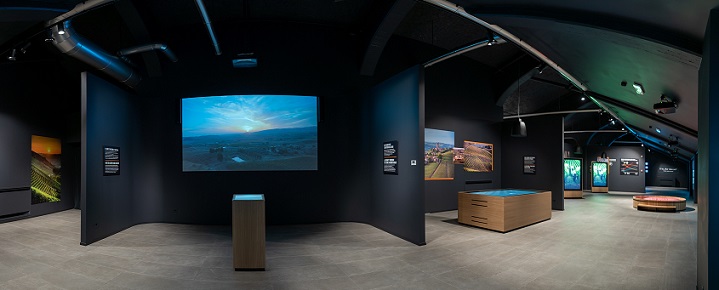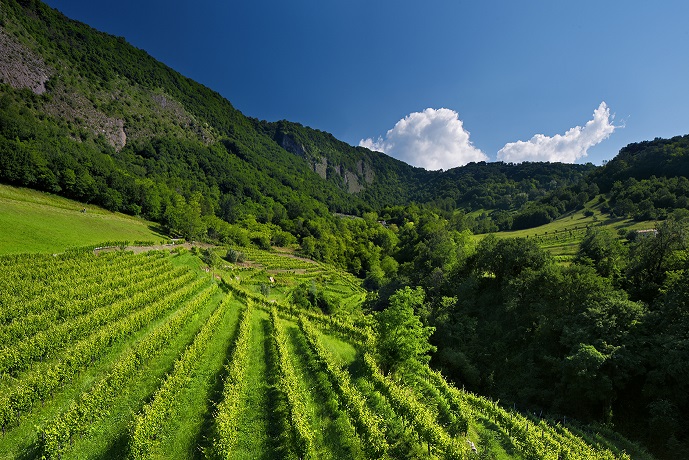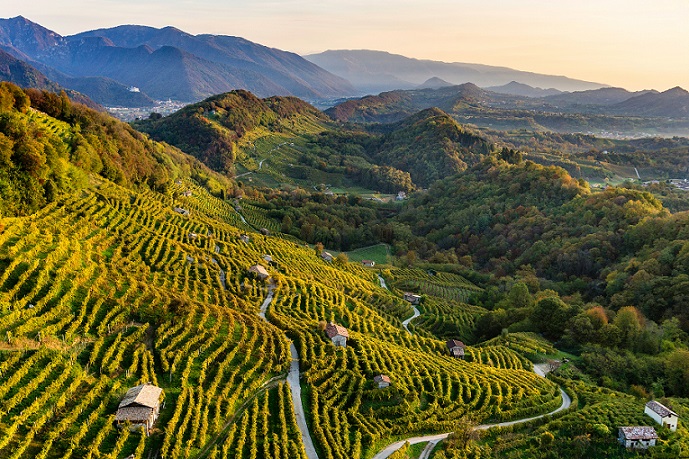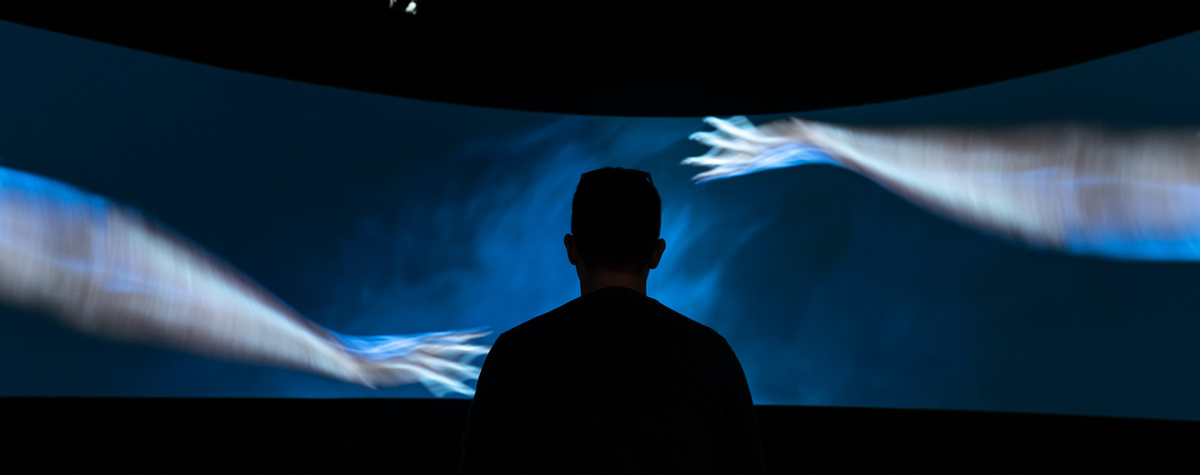In the heart of Roero, in Piedmont, the ‘experience’ is a multimedia installation that explores wine through the five senses.
“We wanted to offer the tourist and the simple curious a special occasion to discover the world of wine going beyond the beauty of the wine territories,” explained Marco Martini, CEO of Mondodelvino. “Exploring, through the aid of modern digital and multimedia technologies, the millenary history, the richness of biodiversity offered by the vines, the curiosities hidden in its long and complex production process and in the secrets of tasting and pairing at the table, in a unique experiential journey.”

At the opening by company founder Alfeo Martini and the Mayor of Priocca, Marco Perosino, Marco Martini said he wanted the ‘Wine Experience’ to become a tourist destination for visitors coming to Roero, Langhe, Asti and Monferrato.
The attraction was created in collaboration with Disko, a digital agency specialising in communication strategies, and Capellino Architettura, a group of young architects. Guided by narrators, visitors follow an interactive, virtual, digital path through the following areas: a history of wine; wine regions and wineries of Mondodelvino; grape varieties, winemaking methods from the vine to the bottle; packaging; multisensorial lab; wine & gastronomy; and sustainability.
'The future is not just about growth and desire for results'The project illustrates that Mondodelvino takes sustainability seriously. Marco Martini states: “The future is not just about growth and desire for results, but above all the desire to pursue the social, environmental and economic sustainability model of the whole group.”
The group’s certifications include:
- ISO 14001: 2015 – the company says this certification helped it “to improve our environmental performance through more efficient practices, taking into consideration all aspects of our processes and at the same time paying particular attention to important issues such as air and water pollution, waste management, packaging, transportation, and efficiency.
- SA8000: 2014 – this international certification measures the CSR (Corporate Social Responsibility) of a company in nine crucial areas: child labour, forced or compulsory labour, health and safety, freedom of association and right to collective bargaining, discrimination, disciplinary practices, working hours, remuneration, and management system.
- BSCI COMPLIANCE – this standard guarantees that the group acts not only in compliance with legal requirements, but also in line with the most recent global standards of CSR.
“We measure the environmental footprint of all our wineries, all our products, and our entire organisation,” says Marco. “The OEF results from Mondodelvino indicate that our main focal points are energy consumption, the life cycle of grapes, and packaging production.”
The Wine Experience is open Tuesday to Sunday from 10am to 1pm and from 3.30 to 7.30pm.
Bottega’s 5 green paths
The United Nations’ 17 principles for sustainable development are 'our guideline when we have to take every single decision'
Italian producer Bottega, a family-owned winery and distillery located in Bibano, Treviso, says its ‘green’ inspiration is the United Nations’ 17 principles for sustainable development. These include: good health and well-being for people, gender equality, clean energy, reducing inequalities, responsible consumption and production, and climate action.
The company, which has a turnover of almost €60m, says: “We are inspired every day by these principles, making them our beacon in the night, our guideline when we have to take every single decision.”In practical terms, Bottega’s commitment to eco-friendly practices is based on five pillars.
1 Green premises. The head office, located in a 19th century farmhouse, has been painstakingly restored to preserve the original architectural characteristics and to fit in with the backdrop – 10ha of vineyards. The buildings are designed to reduce energy consumption and the energy that is used comes from renewable sources (certified by Greener). The geothermal air-conditioning uses water from natural springs (whose constant temperature is 14°C), which is further heated, if necessary, and piped into radiators. This ‘pillar’ saves approximately 756 tons of CO2 per year.

2 Organic vineyards. All of the company’s vineyards in Bibano, Follina and Vittorio Veneto (above) – 14.5ha in total – are managed in accordance with the principles of organic farming. This practice, certified by SQNPI (Sistema Qualità Nazionale Produzione Integrata), saves approximately 500kg of synthetic chemicals, which would otherwise be dispersed in vineyards and soil. In addition, Bottega encourages biodiversity for its integrated pest management system. “You find bees in our vineyards, always,” Sandro Bottega, the owner and managing director, told Canopy.
'You find bees in our vineyards, always'3 Water independent distillery. A new water recirculation system was introduced in the distillery in July 2014. The water used in the distillation process is air-cooled by special fans and conducted in a closed circuit. This solution dramatically reduces the water consumption of the whole procedure: the former consumption at full speed was approximately 4 cubic metres per hour, while the new system allows the company to achieve almost a total saving.
'These practices save approximately 7 million of litres of water per year'The bottling plant also partially recycles the water used to wash the bottles before filling them with wine. These practices save approximately 7 million of litres of water per year.
Bottega has also invested in two purification systems for waste-water and industrial-waste treatment. The first of the two is a plant-based sewage-treatment facility which allows for the disposal of waste water coming from bathrooms and kitchens. Filtered through a gravel substrate, the effluent provides sustenance to trees and shrubs planted in the surrounding land. The second system is an aerobic-based biological one using activated sludge which purifies and disposes of industrial waste (primarily lees, organic residue ensuing from the sparkling-wine distillation and production process as well as water used to clean the equipment). It has an average capacity of 36 m3 per day, hitting a maximum peak of 72 m3 per day, and is able to cope with a daily organic load of 290kg of CO2. This kind of plant creates an artificial environment which mimics the same biological mechanisms put in place by nature and purifies water polluted by biodegradable organic substances. The difference is essentially linked to performance because transformation occurs much more rapidly and occupies much less space.
4 Biomass-powered distillery. Bottega is constructing a distillation plant powered by grape marc. After the distillation, worn-out marc is dried using the hot steam from the distillery, thus transformed into the fuel which will then heat the pot stills. Hence, in the future, Bottega and Alexander distillates will result from a process that recycles waste material, significantly reducing the production of CO2.
5 FSC-certified products. Bottega demands that its suppliers use only FSC-certified paper and cardboard products. This practice saves approximately 1 million kg of paper per year. Bottega also recycles self-adhesive label by-products that would otherwise be incinerated or go into landfill. This practice, carried out by German company UPM Raflatac, saves approximately 12 tons of waste per year.
In addition, Bottega mainly uses dark glass bottles which are made from 50% recycled glass.
Sandro Bottega told Canopy: “We believe we have to preserve the environment that we have in Prosecco.”
Glyphosate ban
UNESCO’s recent recognition of the Prosecco Hills as a World Heritage Site is the latest step in a long-term strategy to protect the sustainability and heritage of the small area producing Conegliano Valdobbiadene Prosecco Superiore, according to Innocente Nardi.The president of the Consortium for the Protection of Conegliano Valdobbiadene Prosecco DOCG says the next steps include ever-deeper sustainable conservation of the landscape, and – in line with UNESCO values – ensuring its protection for future generations in a way that allows both nature and the community to thrive.
Another key objective is to ensure the sensitive and sustainable development of growing tourism and eno-tourism in the territory. Research has shown that World Heritage status can have a major socio-economic impact, particularly when the local stakeholders are highly engaged and cooperative, as they are in this DOCG.

Prior to the announcement of the UNESCO recognition, the Consorzio of Conegliano Valdobbiadene Prosecco Superiore DOCG banned the use of glyphosate in the vineyards, making it the largest wine zone in Europe to ban the usage of this substance, the active ingredient in many herbicides.
The ruling was the outcome of several years of research and discussion between the Consorzio that represents the wine producers, and the 15 local councils of the region.
The glyphosate ban is now part of the Consorzio’s ‘Viticultural Protocol’. Launched in 2011, the protocol is a set of guidelines tailored for local conditions. The protocol advises producers on how to adopt viticulture that reduces inputs in favour of environmentally sustainable approaches.
'Our area is a unique test-bed for environmental sustainability in Italy'Innocente Nardi, who represents 185 producers, says: “The ban on the use of glyphosate makes the advice we give to the growers on sustainable, alternative vineyard management, such as the use of mechanical mowing, increasingly necessary. But we are particularly proud that this ban on glyphosate, legally imposed by the local governments within our denomination, has come about thanks to a close dialogue between the consortium and these bodies. Our area is a unique test-bed for environmental sustainability in Italy, due to its ability to bring together all of the stakeholders involved.”
The next step for sustainability in the region is an ambitious new project to achieve official certification for producers through the SQNPI scheme. This is a scheme that takes into account all the methods of production and defence against pests and diseases, so as to minimise the use synthetic chemical substances and fertilisers.
Two objectives are being aimed for: certifying 25% of those taking part by 2021 and increasing certifications by 10% in each subsequent year.
All the vinifying and bottling companies that pass will be able to use a bee logo on their products. Valoritalia is the certifying body.











.png)









